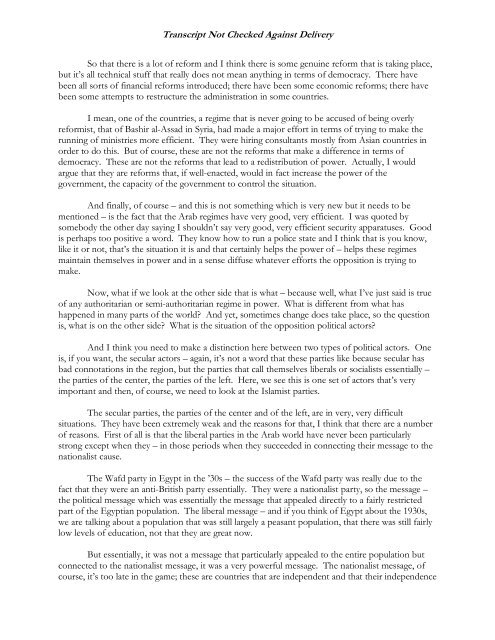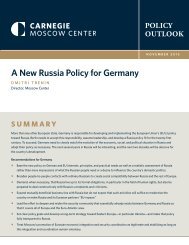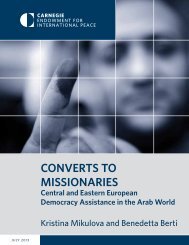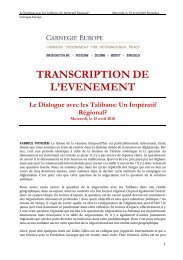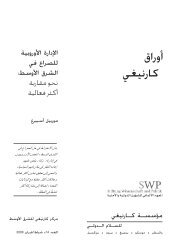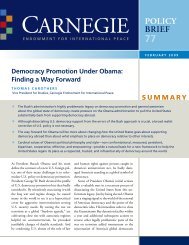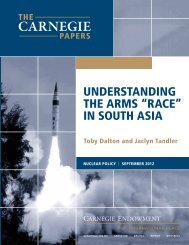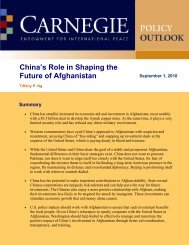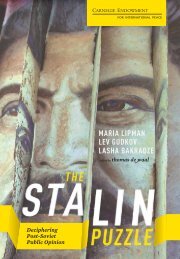getting to pluralism: political actors in the arab world - Carnegie ...
getting to pluralism: political actors in the arab world - Carnegie ...
getting to pluralism: political actors in the arab world - Carnegie ...
You also want an ePaper? Increase the reach of your titles
YUMPU automatically turns print PDFs into web optimized ePapers that Google loves.
Transcript Not Checked Aga<strong>in</strong>st Delivery<br />
So that <strong>the</strong>re is a lot of reform and I th<strong>in</strong>k <strong>the</strong>re is some genu<strong>in</strong>e reform that is tak<strong>in</strong>g place,<br />
but it’s all technical stuff that really does not mean anyth<strong>in</strong>g <strong>in</strong> terms of democracy. There have<br />
been all sorts of f<strong>in</strong>ancial reforms <strong>in</strong>troduced; <strong>the</strong>re have been some economic reforms; <strong>the</strong>re have<br />
been some attempts <strong>to</strong> restructure <strong>the</strong> adm<strong>in</strong>istration <strong>in</strong> some countries.<br />
I mean, one of <strong>the</strong> countries, a regime that is never go<strong>in</strong>g <strong>to</strong> be accused of be<strong>in</strong>g overly<br />
reformist, that of Bashir al-Assad <strong>in</strong> Syria, had made a major effort <strong>in</strong> terms of try<strong>in</strong>g <strong>to</strong> make <strong>the</strong><br />
runn<strong>in</strong>g of m<strong>in</strong>istries more efficient. They were hir<strong>in</strong>g consultants mostly from Asian countries <strong>in</strong><br />
order <strong>to</strong> do this. But of course, <strong>the</strong>se are not <strong>the</strong> reforms that make a difference <strong>in</strong> terms of<br />
democracy. These are not <strong>the</strong> reforms that lead <strong>to</strong> a redistribution of power. Actually, I would<br />
argue that <strong>the</strong>y are reforms that, if well-enacted, would <strong>in</strong> fact <strong>in</strong>crease <strong>the</strong> power of <strong>the</strong><br />
government, <strong>the</strong> capacity of <strong>the</strong> government <strong>to</strong> control <strong>the</strong> situation.<br />
And f<strong>in</strong>ally, of course – and this is not someth<strong>in</strong>g which is very new but it needs <strong>to</strong> be<br />
mentioned – is <strong>the</strong> fact that <strong>the</strong> Arab regimes have very good, very efficient. I was quoted by<br />
somebody <strong>the</strong> o<strong>the</strong>r day say<strong>in</strong>g I shouldn’t say very good, very efficient security apparatuses. Good<br />
is perhaps <strong>to</strong>o positive a word. They know how <strong>to</strong> run a police state and I th<strong>in</strong>k that is you know,<br />
like it or not, that’s <strong>the</strong> situation it is and that certa<strong>in</strong>ly helps <strong>the</strong> power of – helps <strong>the</strong>se regimes<br />
ma<strong>in</strong>ta<strong>in</strong> <strong>the</strong>mselves <strong>in</strong> power and <strong>in</strong> a sense diffuse whatever efforts <strong>the</strong> opposition is try<strong>in</strong>g <strong>to</strong><br />
make.<br />
Now, what if we look at <strong>the</strong> o<strong>the</strong>r side that is what – because well, what I’ve just said is true<br />
of any authoritarian or semi-authoritarian regime <strong>in</strong> power. What is different from what has<br />
happened <strong>in</strong> many parts of <strong>the</strong> <strong>world</strong>? And yet, sometimes change does take place, so <strong>the</strong> question<br />
is, what is on <strong>the</strong> o<strong>the</strong>r side? What is <strong>the</strong> situation of <strong>the</strong> opposition <strong>political</strong> ac<strong>to</strong>rs?<br />
And I th<strong>in</strong>k you need <strong>to</strong> make a dist<strong>in</strong>ction here between two types of <strong>political</strong> ac<strong>to</strong>rs. One<br />
is, if you want, <strong>the</strong> secular ac<strong>to</strong>rs – aga<strong>in</strong>, it’s not a word that <strong>the</strong>se parties like because secular has<br />
bad connotations <strong>in</strong> <strong>the</strong> region, but <strong>the</strong> parties that call <strong>the</strong>mselves liberals or socialists essentially –<br />
<strong>the</strong> parties of <strong>the</strong> center, <strong>the</strong> parties of <strong>the</strong> left. Here, we see this is one set of ac<strong>to</strong>rs that’s very<br />
important and <strong>the</strong>n, of course, we need <strong>to</strong> look at <strong>the</strong> Islamist parties.<br />
The secular parties, <strong>the</strong> parties of <strong>the</strong> center and of <strong>the</strong> left, are <strong>in</strong> very, very difficult<br />
situations. They have been extremely weak and <strong>the</strong> reasons for that, I th<strong>in</strong>k that <strong>the</strong>re are a number<br />
of reasons. First of all is that <strong>the</strong> liberal parties <strong>in</strong> <strong>the</strong> Arab <strong>world</strong> have never been particularly<br />
strong except when <strong>the</strong>y – <strong>in</strong> those periods when <strong>the</strong>y succeeded <strong>in</strong> connect<strong>in</strong>g <strong>the</strong>ir message <strong>to</strong> <strong>the</strong><br />
nationalist cause.<br />
The Wafd party <strong>in</strong> Egypt <strong>in</strong> <strong>the</strong> ’30s – <strong>the</strong> success of <strong>the</strong> Wafd party was really due <strong>to</strong> <strong>the</strong><br />
fact that <strong>the</strong>y were an anti-British party essentially. They were a nationalist party, so <strong>the</strong> message –<br />
<strong>the</strong> <strong>political</strong> message which was essentially <strong>the</strong> message that appealed directly <strong>to</strong> a fairly restricted<br />
part of <strong>the</strong> Egyptian population. The liberal message – and if you th<strong>in</strong>k of Egypt about <strong>the</strong> 1930s,<br />
we are talk<strong>in</strong>g about a population that was still largely a peasant population, that <strong>the</strong>re was still fairly<br />
low levels of education, not that <strong>the</strong>y are great now.<br />
But essentially, it was not a message that particularly appealed <strong>to</strong> <strong>the</strong> entire population but<br />
connected <strong>to</strong> <strong>the</strong> nationalist message, it was a very powerful message. The nationalist message, of<br />
course, it’s <strong>to</strong>o late <strong>in</strong> <strong>the</strong> game; <strong>the</strong>se are countries that are <strong>in</strong>dependent and that <strong>the</strong>ir <strong>in</strong>dependence


